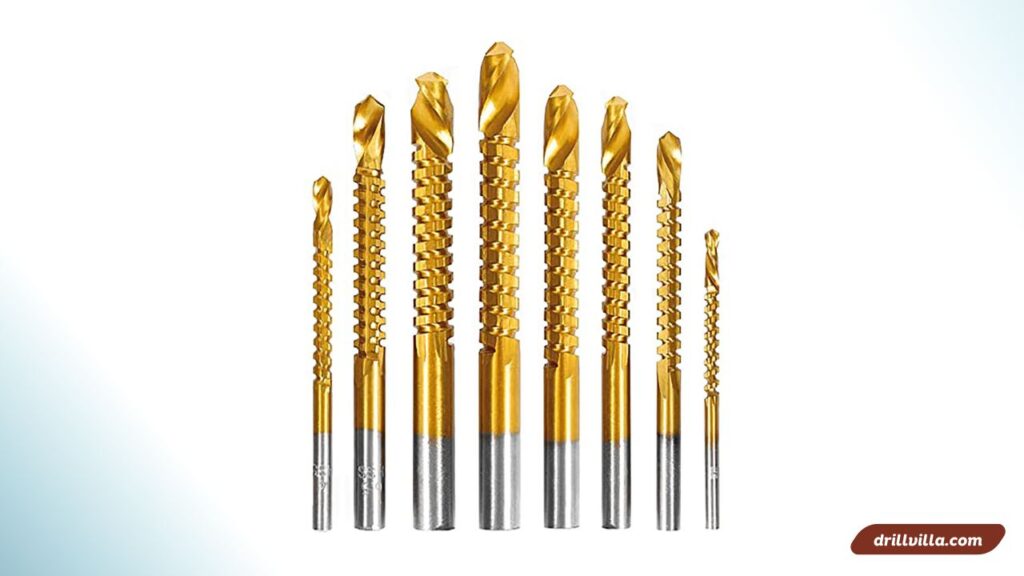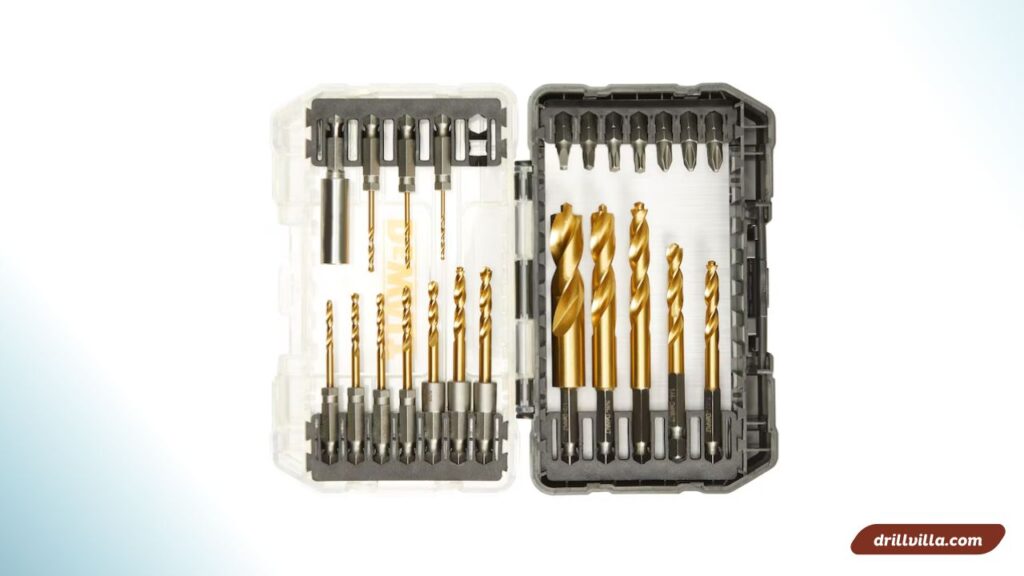When I first started drilling into metal, I didn’t have a clue what “HSS titanium drill bits” even meant. All I knew was that my basic bits kept wearing out fast. If you’ve ever struggled with broken drill bits, smoking holes, or just not knowing which bit to grab for a tough job, you’re not alone. Let me walk you through what I’ve learned the hard way—so you don’t have to.
Article Summary
- What Is HSS Titanium Drill Bits, Anyway?
- My First Encounter with HSS Titanium Drill Bits
- What Makes HSS Titanium Drill Bits Special?
- Types of Titanium Coatings (Yes, There’s More Than One)
- How Long Do HSS Titanium Drill Bits Last?
- How to Use HSS Titanium Drill Bits the Right Way
- Pros and Cons
- Comparing HSS Titanium Drill Bits to Other Types
- How to Store and Maintain Them
- Common Mistakes to Avoid
- Which Is Better: HSS or Titanium Drill Bits?
- Are Cobalt Drill Bits Better Than HSS?
- FAQs
- Final Thoughts
What Is HSS Titanium Drill Bits, Anyway?
Let’s break it down:
- HSS stands for High-Speed Steel.
- Titanium refers to the coating on the drill bit, not the core material.
So basically, you’re looking at a tough steel drill bit coated with titanium nitride (TiN), which gives it that gold-ish color. It’s not made of titanium, just covered with it.
Why Add Titanium?
Here’s why that coating matters:
- Reduces friction
- Stays sharper longer
- Increases lifespan
- Works better with hard metals
Think of it like non-stick spray for cooking—it makes everything smoother.
My First Encounter with HSS Titanium Drill Bits
A few years ago, I was trying to install some metal brackets in my garage. My cheap drill bit turned blue and snapped halfway in. Total disaster.
I went to the hardware store, and the guy handed me a gold-colored bit and said, “Try this. It’s HSS with titanium coating. It’ll cut like butter.”
Honestly? He wasn’t lying. That bit sliced into the steel like it was softwood. I’ve been using them ever since.
What Makes HSS Titanium Drill Bits Special?
Let’s zoom in on what sets these bits apart.
1. Durability
- Titanium coating increases wear resistance
- HSS core means they can handle high temps
2. Speed
- Less friction = faster cutting
3. Clean Cuts
- Titanium helps reduce burrs and jagged edges
4. Versatility
You can use them on:
- Metal (steel, aluminum, brass)
- Wood
- Plastic
Pro Tip: Don’t use them on concrete or masonry. That’s a job for carbide bits.

Types of Titanium Coatings (Yes, There’s More Than One)
Here’s a quick table to help you understand the options:
| Coating Type | Full Name | Best For |
|---|---|---|
| TiN | Titanium Nitride | General metal & wood drilling |
| TiCN | Titanium Carbonitride | Tougher materials like cast iron |
| TiAlN | Titanium Aluminum Nitride | High heat jobs like CNC work |
I mostly use TiN for my home projects, but if you’re working with stainless steel often, TiCN or TiAlN might be worth the extra bucks.
How Long Do HSS Titanium Drill Bits Last?
Here’s the short answer: Way longer than uncoated ones.
But it also depends on:
- How often you use them
- What materials you’re drilling
- Whether you use cutting oil (please do!)
- Drill speed and pressure
I’ve had some last me over a year, while others gave out in weeks because I got lazy and skipped the oil. Lesson learned.
How to Use HSS Titanium Drill Bits the Right Way
Follow these basic steps to get the most out of your bits:
- Mark the spot you want to drill
- Start slow to prevent walking
- Use cutting fluid for metal jobs
- Don’t push too hard; let the bit do the work
- Back out often to clear debris
Think of it like shaving—slow, steady, and with some lubrication goes a long way.
Pros and Cons
Pros
- Long-lasting
- Clean and fast cuts
- Versatile
- Easy to find in stores
Cons
- Can’t be sharpened once the coating wears off
- More expensive than basic bits
- Not ideal for masonry
Comparing HSS Titanium Drill Bits to Other Types
Here’s a handy comparison chart:
| Drill Bit Type | Material | Coating | Best Use | Sharpenable |
| HSS Titanium | High-speed steel | Titanium Nitride | Metal, wood, plastic | No |
| Cobalt | HSS + Cobalt alloy | None | Stainless steel, hard metal | Yes |
| Carbide | Tungsten Carbide | Often TiAlN | Concrete, masonry | No |
| Black Oxide | HSS | Black Oxide | Wood and light metals | Yes |
I use cobalt for the really tough stuff and titanium for everyday use.
How to Store and Maintain Them
Here’s what I do to keep my bits in top shape:
- Use a bit index case to stay organized
- Clean after each use (a quick wipe is enough)
- Avoid rust by storing in a dry place
- Label them so you don’t mix up coated and uncoated bits
Common Mistakes to Avoid
- Using on the wrong materials
- Drilling too fast and too hard
- Not using lubricant on metal
- Storing in damp environments
Each mistake can shorten the life of your bit—trust me, I’ve made them all.
Which Is Better: HSS or Titanium Drill Bits?
Okay, so here’s the deal — when I first got into DIY projects, I didn’t even know there was a difference between drill bits. I just grabbed whatever was cheapest. Big mistake. If you’ve ever stood over a metal sheet with smoke curling up and a dull bit squealing, you know what I mean.
Let’s break this down the easy way.
HSS (High-Speed Steel) drill bits are your standard go-to bits. They’re tough, they stay sharp for a while, and they work on wood, plastic, and soft metals. They’re also cheap. Like, budget-friendly cheap. That’s great when you’re drilling a few holes here and there.
But then, there’s the HSS titanium drill bits. These are HSS bits, but they’ve got a golden coat — literally. That shiny gold layer? That’s titanium nitride (TiN). It’s not just for looks. It makes the bit stronger, harder, and way more heat-resistant.
So, which one’s better?
Here’s how I see it:
| Feature | HSS Bits | HSS Titanium Bits |
|---|---|---|
| Price | Lower | Slightly higher |
| Durability | Good | Better (lasts 2–3 times longer) |
| Heat resistance | Standard | High (great for longer jobs) |
| Surface treatment | None | Titanium nitride coating |
| Ideal for | Casual DIY, soft materials | Repeated drilling, harder materials |
My Take?
If you’re just fixing a few things at home, plain HSS works fine. But if you’re like me and tend to go full “weekend warrior” mode on projects — like drilling into metal brackets or hardwood — go for the titanium-coated ones.
I learned the hard way after burning through a pack of cheap bits. Since switching to HSS titanium drill bits, I haven’t looked back. They glide through metal like butter and stay sharp much longer. Totally worth the few extra bucks.ca
Are Cobalt Drill Bits Better Than HSS?
Let me tell you a quick story. I once tried drilling through stainless steel with an HSS bit. It squeaked. It smoked. It dulled in seconds. I was frustrated, sweaty, and halfway convinced my drill was broken. Spoiler: it wasn’t. I was just using the wrong bit.
That’s when someone at the hardware store told me about cobalt drill bits.
So let’s compare — are cobalt drill bits better than HSS or HSS titanium bits?
First, cobalt bits aren’t coated like titanium bits. The cobalt is mixed right into the steel — it’s part of the material. That means even if the bit gets worn down, the cutting edge is still cobalt-tough all the way through.
Here’s a quick comparison that helped me understand it better:
| Drill Bit Type | Material Makeup | Best For | Heat Resistance | Longevity |
|---|---|---|---|---|
| HSS | High-speed steel | Wood, soft metals | Good | Basic |
| HSS Titanium | HSS + titanium coating | Wood, plastic, mild metals | Better | 2–3x HSS |
| Cobalt | Steel alloy with cobalt (5–8%) | Stainless steel, hardened steel | Excellent | Long-lasting |
Real Talk?
Yes — cobalt bits are better than plain HSS. If you’re drilling into anything tough like cast iron or stainless steel, cobalt is king.
But remember this: cobalt bits are brittle. They can snap if you twist them too hard or drill at the wrong angle. They’re not great for wood or plastic either — they’ll just chew through soft stuff too fast.
I use HSS titanium drill bits for 80% of my home projects — especially when I want a bit that lasts but won’t break the bank. I save the cobalt drill bits for when I need serious cutting power, like when I’m working with metal fence posts or car parts.
Quick Tip: If you’re not sure what material you’re drilling into, start with a titanium-coated HSS bit. If it struggles or dulls quickly, then you know it’s time to grab a cobalt one.

FAQs
Can I sharpen HSS titanium drill bits?
Nope. Sharpening removes the titanium coating, which defeats the purpose.
Are they good for stainless steel?
They can work, but cobalt bits are better for long-term stainless steel work.
Why are they gold-colored?
That’s the titanium nitride coating. It’s not just for looks!
Do I need a special drill?
No. Any regular drill will do, just match your speed and pressure.
Final Thoughts
So, what is HSS titanium drill bits in plain English? It’s your go-to option for a durable, reliable drill bit that handles most everyday materials with ease. I use them for everything from hanging shelves to fixing car parts. They’re not the best for everything, but for 90% of jobs around the house or garage, they’re my first pick.
If you’ve been burning through cheap bits and wondering what you’re doing wrong, give HSS titanium bits a try. Just remember—go slow, use cutting oil, and don’t push too hard. Your bits (and your hands) will thank you.
Know More:
- How Much Does It Cost To Drill A Bowling Ball?
- What Size Drill Bit for 10 Screw
- Are You Supposed To Submerge Powered Orthopedic Drills For Decontamination?
- A 135 Split Point Cobalt Letter Drill Bits?
- How Long Does It Take to Drill a Water Well?
- What Type of Drill Bits Won’t Snap?
- What Are the Best Drill Bits for Stainless Steel?